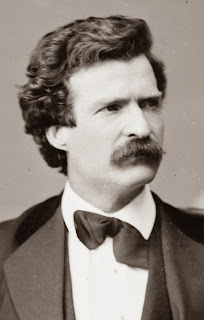I AM GLAD TO BE HERE. This is the hardest theatre in New York to get into, even at the front door. I never got in without hard work. I am glad we have got so far in at last.
 |
| Mark Twain |
Well, I was kind of bored on the train, and I bought some newspapers—New Haven newspapers—and there was not much news in them, so I read the advertisements. There was one advertisement of a bench-show. I had heard of bench-shows, and I often wondered what there was about them to interest people. I had seen bench-shows—lectured to bench-shows, in fact—but I didn’t want to advertise them or to brag about them.
Well, I read on a little, and learned that a bench-show was not a bench-show—but dogs, not benches at all—only dogs. I began to be interested, and as there was nothing else to do I read every bit of the advertisement, and learned that the biggest thing in this show was a St. Bernard dog that weighed one hundred and forty-five pounds.
Before I got to New York I was so interested in the bench-shows that I made up my mind to go to one the first chance I got. Down on Sixth Avenue, near where that back door might be, I began to take things leisurely. I did not like to be in too much of a hurry. There was not anything in sight that looked like a back door.
 |
| Augustin Daly |
There was another door beyond and I went there, and was met by a big, fierce man with a fur cap on and coat off, who remarked, “Phwat do yez want?” I told him I wanted to see Mr. Daly. “Yez can’t see Mr. Daly this time of night,” he responded.
I urged that I had an appointment with Mr. Daly, and gave him my card, which did not seem to impress him much. “Yez can’t get in and yez can’t shmoke here. Throw away that cigar. If yez want to see Mr. Daly, yez ‘ll have to be after going to the front door and buy a ticket, and then if yez have luck and he’s around that way yez may see him.”
I was getting discouraged, but I had one resource left that had been of good service in similar emergencies. Firmly but kindly I told him my name was Mark Twain, and I awaited results. There was none. He was not fazed a bit. “Phwere’s your order to see Mr. Daly?” he asked.
I handed him the note, and he examined it intently. “My friend,” I remarked, “you can read that better if you hold it the other side up.”
But he took no notice of the suggestion, and finally asked: “Where’s Mr. Daly’s name?”
“There it is,” I told him, “on the top of the page.”
“That’s all right,” he said, “that’s where he always puts it; but I don’t see the ‘W’ in his name,” and he eyed me distrustfully. Finally, he asked, “Phwat do yez want to see Mr. Daly for?”
“Business.”
“Business?”
“Yes.” It was my only hope.
“Phwat kind—theatres?” that was too much.
“No.”
“What kind of shows, then?”
“Bench-shows.” It was risky, but I was desperate.
“Bench—shows, is it—where?” The big man’s face changed, and he began to look interested.
“New Haven.”
“New Haven, it is? Ah, that’s going to be a fine show. I’m glad to see you. Did you see a big dog in the other room?”
“Yes.”
“How much do you think that dog weighs?”
“One hundred and forty-five pounds.”
“Look at that, now! He’s a good judge of dogs, and no mistake. He weighs all of one hundred and thirty-eight. Sit down and shmoke—go on and shmoke your cigar, I’ll tell Mr. Daly you are here.”
In a few minutes I was on the stage shaking hands with Mr. Daly, and the big man standing around glowing with satisfaction. “Come around in front,” said Mr. Daly, “and see the performance. I will put you into my own box.”
And as I moved away I heard my honest friend mutter, “Well, he desarves it.”
– 13 April 1887
No comments:
Post a Comment